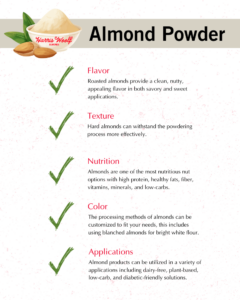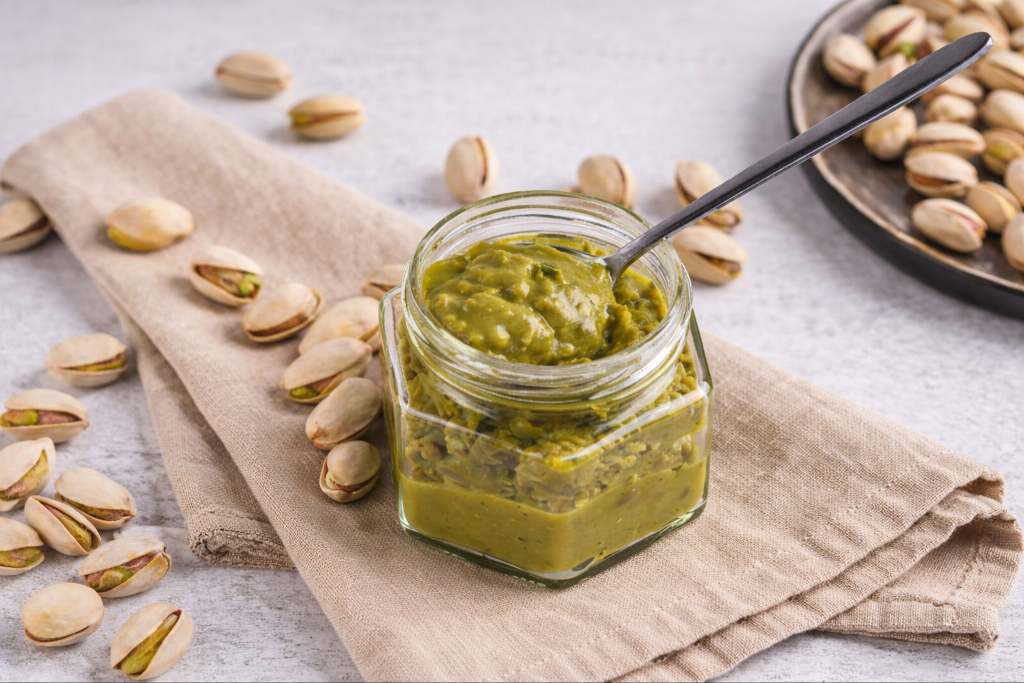Benefits of Nut Powder
Nut powder provides manufacturers, chefs, R&D specialists, and health and wellness brands with an easy way to offer high-protein products without using animal protein. For health-conscious consumers and shoppers, nut powder serves an important role in boosting nutrients, minerals, and fiber. The plant-based protein offered by nuts will satisfy a wide range of diets including vegetarian, vegan, keto, paleo, gluten-free, diabetic-friendly, and more.
A key reason for using nut powders in place of wheat flour is to eliminate the need for heat treatment. Nut powder does not have to be heat treated as wheat flour does for product safety. Therefore, you can substitute nut powder for wheat flour in raw or non-baked products like health bars and protein shakes.
The taste of foods is enhanced by the mild flavor of nuts, which are also quite versatile. Nut enthusiasts and aficionados also appreciate the higher quality that comes from locally sourced flours made fresh and using nuts grown in the US.
Nut Powder Applications
You can add a nut powder to a food product, such as smoothies, and the result will be a nutty flavor and creamy texture. Peanuts, almonds, and even cashew nut powder go well in protein bars, beverages, and baked goods. When looking to improve flavor in baked goods, especially, nut powder is preferred over conventional flour using wheat grain. Nut powder is also a nutritious product for replacing gluten flour in bars and baked products. Athletes interested in maintaining their physique or weight loss can benefit from muscle mass developed from the protein in nut powder.
Snack foods, desserts, bread, and fish can all be improved with the use of nut powders. Use nut powder to coat fish for frying or to add protein to sandwich bread. As an alternative ingredient, nut powder is readily available for commercially manufactured products. In addition, nut powder is widely acceptable by consumers for a number of diet programs and food restrictions.
Types of Nut Powders
Did you know there are more than 50 types of nuts currently growing on this planet, and 20 of these are edible?
Before selecting a particular nut powder, there are a lot of options to consider. The nut industry is readily processing many types of nut powders. This includes:
- Almond Powder: Almonds are one of the healthiest nut options out there. Almonds are super versatile and a popular ingredient solution for their taste, nutrition facts, and texture.
- Cashew Powder: Cashew powder is a versatile option for both sweet and savory applications.
- Pistachio Powder: Pistachios are another great source of nutrients and produce a unique, green powder.
- Walnut Powder: Walnut products are linked to a long list of benefits including heart health and disease prevention.
- Peanut Powder: Peanuts are widely known as a great source of plant protein and an extremely resourceful ingredient.
Almond Powder: Amplifying All The Benefits of Nut Powder
Almond powder is one of the most innovative, versatile, and high-quality nut powder solutions in today’s market.
The almond really stands up to the vigorous powder process. While cashews turn from cashew meal to cashew butter very quickly, almonds are hardier and can withstand the powdering procedure more effectively. Locally sourced almonds are used for fresh nut powder to ensure the highest quality product.
To choose the right nut powder, consider three major areas:
- Flavor
- Texture
- Color
- Nutrition
Each nut offers a distinct texture, flavor, and color, which extends to the overall finished food or beverage. The creamy white texture of cashews, for example, differs from the warm brown tone of peanuts—almond powder benefits from the mild sweet almond oil flavor you find in many baked goods. Pistachio lends a green hue to its naturally processed powder.
The nutrient comparison of each tree nut should also be considered. When comparing one-ounce portions of some of the most popular nuts, including almonds, cashew, walnuts, and more, you’ll get a full picture of what nutrients nut powders can bring to your formulation.
By researching and selecting individual nut powders for multiple products, you can improve a line of foods or health additives in a variety of ways. Transform foods to be more nutritious, higher in protein, and lower in carbs with the use of almond powder in place of wheat or other proteins.
Why Do Almonds Make the Best Nut Powder?
According to the International Food Information Council Foundation, nearly one-quarter of consumers choose foods based on nutritional data. Twenty-three percent of shoppers in 2019 wanted products that boost energy; improve heart and digestive health; and increase weight loss. Eleven percent of consumers surveyed were overweight or obese and being treated for this health condition.
Therefore, it is important that manufacturers look for healthy additives to increase the value of products on store shelves. This increases health and wellness from the consumption of products with more vitamins and fewer cheap fillers.
By focusing on nutritionally dense additives, such as almonds in the form of powder, manufacturers can increase nutritional levels. Healthline reports that almond powder is preferred because of its slightly sweeter flavor. In addition, almonds are low in carbohydrates, which meets the needs of low-carb diets. Almond nut powder supports lowering LDL cholesterol while boosting insulin resistance.
 Blanched Almond Powder
Blanched Almond Powder
Almonds can be processed to result in a more satisfactory all-white powder product. As a result, bakeries and food processors find that the use of blanched almonds for almond powder is superior as an alternate flour to wheat. For companies specializing in gluten-free and low-carbohydrate diet products and foods, the use of blanched almond powder is common.
Defatted Almond Powder
The process of defatting nut powder, specifically almond powder, is a key component to producing a high-quality end product. Defatting nut powders create a highly concentrated powder that contains more protein, fewer calories, and less fat. Defatting nut powders also contributes to a cleaner, smoother taste.
Harris Woolf Almonds uses an innovative process to defat our almond powder. This process includes a hydraulic press that removes excess almond oil. The result is almond flour or almond protein powder with an enhanced taste and a higher nutrient density.
Harris Woolf Almonds: An Industry-Leading Almond Flour & Protein Powder Producer
Delicious nut powders, specifically almond powder, can bring real value to a variety of recipes, which is why the demand for these ingredients is skyrocketing. Ensure you are utilizing the highest-quality nut solutions with Harris Woolf Almonds. HWA offers a variety of almond products, including almond protein powder and almond flour.
When American-grown products or ingredients are required by your clients or consumers, you need a grower like Harris Woolf Almonds by your side. By choosing sustainably sourced almonds, you benefit from having USA-grown ingredients and nutritional value in your end products. Contact our team today to learn more about our almond solutions!
















 Blanched Almond Powder
Blanched Almond Powder

